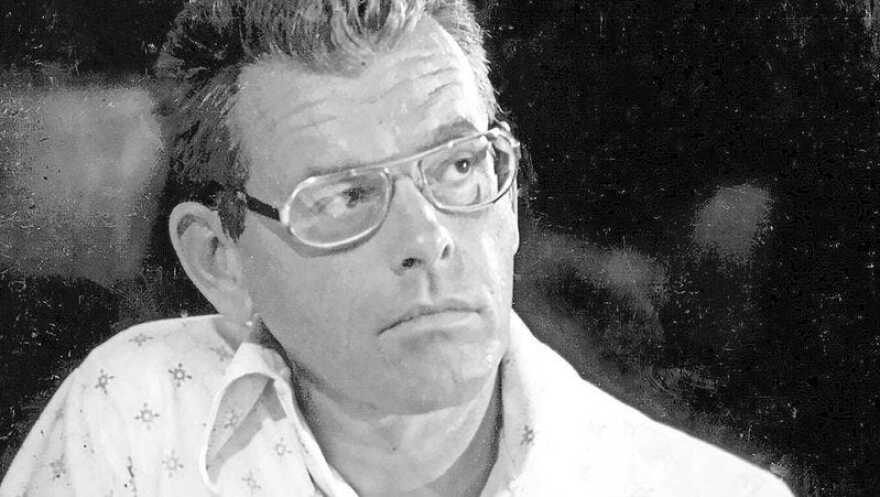It’s been more than 40 years since the murder of Don Bolles, a reporter with the Arizona Republic. He died after a bomb was planted in his car, exploding when he turned on the ignition. Bolles had been pursuing a story about corruption in state government and planned a meeting with an unidentified informant. That person never showed up, and when the bomb detonated, it became clear someone wanted Bolles dead. Now, a new podcast will honor his life. It’s produced by Richard Ruelas, also a reporter with the Republic, and it includes long-lost cassette tapes of Bolles voice, found recently in a forgotten storage room. KNAU’s Steve Shadley spoke with Ruelas about the project...
Shadley: “Hello, thanks for joining us…”
Ruelas: “Thanks for having me on…”
Shadley: “If you don’t mind Richard, just remind our listeners about this case…what happened that day?”
Ruelas: “Right, by June of 1976, Don Bolles was covering the state legislature. He gets a source from somebody telling him about some land deal involving some prominent politicians. Bolles was skeptical about the story but this guy promised to give him documents that proved it. So, being the good reporter, curious reporter, he wanted to see what the guy had. So, that man John Adamson, told them they’d meet at the Clarendon Hotel in midtown Phoenix about 11:15. Bolles arrives. He waits. He gets a call in the lobby from the front desk. There were no cell phones obviously back then. The front desk says there’s a call for you Mr. Bolles. It’s John Adamson canceling the meeting. It’s not going to happen today. Bolles walks, takes the long walk, back out to the parking lot. Starts his car, backs out of his parking space, and the dynamite bomb that had been affixed under his car detonated. The bomb didn’t kill him instantly. He was able to tell people, and I guess all the ride, as people tended to him outside of his car and on the ride to the hospital, he was trying to download as much information as he could about who he thought was responsible, so he mentioned John Adamson, the man who had him go to this hotel, and he mentioned Mafia and he mentioned the name “Emprise” which was a company that controlled the dog race tracks—the dog racing tracks at the time in Phoenix.”
Shadley: “Richard, I’m curious if you can tell us more about how this podcast came about? I mean this case is more than 40 years old now…”
Ruelas: “This came about by happenstance. We has a warehouse full of old things, old collections the newspaper had. We decided to go through them. What one of the items they found was like seven or eight file cabinets that were padlocked shut. Nobody could find the key so they hired a locksmith to open these cabinets. Pretty quickly, our editor determined that these were files related to Don Bolles. So, I was tasked with going through the cabinets to see what if any stories might be there. And, I was going through the cabinets, I came across cassette tapes that Bolles made while he was reporting and I thought this is new…maybe there’s something here…that the audio might provide us with a new way to look at the Don Bolles story.”
Shadley: “Well, let’s take a quick listen to some of the tape that you found and let’s give our listeners an idea of what Don Bolles voice sounded like and his demeanor…”
Don Bolles (Archive Recording): “What we’re writing about is organized criminals, organized syndicates, coming into Arizona and trying to walk away with the place, and that’s what they’re doing…”

Shadley: “Now, when you found these cassettes you had no prior knowledge that these cassettes had Don Bolles voice on them. What was your impression when you first heard his voice?”
Ruelas: “Don Bolles’ portrait hangs in our newsroom. I’ve written stories about him. I just never thought about what he sounded like and there’s something about hearing his voice that really humanizes him. It brought him to life.”
Shadley: “And, what do you hope people come away with when they listen? Maybe they aren’t familiar at all with the Don Bolles murder case or maybe they remember those days back in June of 1976…what do you hope the impression that the podcast makes on them?”
Ruelas: “I think its good for people who may only know Don Bolles through the way he died to look at how he lived and how he conducted himself and the industry that he took part in that still tries to carry on his legacy. That still tries to ask questions of powerful people in industries and try to uncover scandals of corruption…all for the benefit of the general public.”
Shadley: “Richard Ruelas of the Arizona Republic, thank you.”
Ruelas: “Thank you for having me…”
That was KNAU’s Steve Shadley speaking with reporter and podcaster Richard Ruelas.
The Arizona Republic’s Don Bolles podcast is updated each week over the next few weeks.


